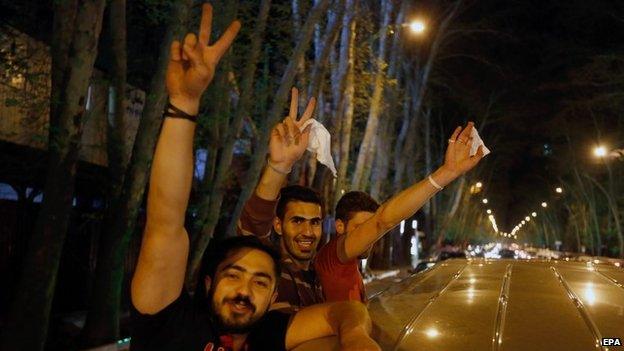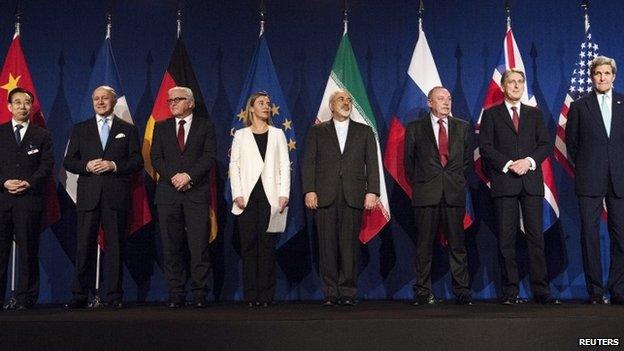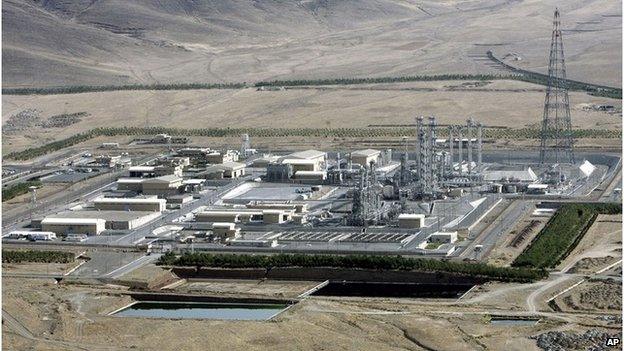Iran nuclear deal: A result which buys time
- Published

Iranians celebrate on the streets but weeks of detailed drafting lie ahead
This is a significant moment in the turbulent history of efforts to constrain Iran's nuclear programme.
Opinion has been bitterly divided on the merits of even seeking a deal with Tehran.
Many on Capitol Hill, for example, have appeared to oppose any deal, preferring - if you strip away their arguments - to seek regime change in Tehran.
In contrast, the overwhelming verdict of nuclear and arms control experts is that diplomacy has delivered a result.
Their preference was always for an agreement that avoided what they saw a bad choice between military action and perhaps a fraying but almost certainly less effective sanctions regime in the future.
This, it must be stressed, is not yet a complete deal. Difficult weeks of detailed drafting lie ahead. But it's a framework on which all parties are agreed. That in itself is an important outcome. Yet this is not a moment for euphoria.
Nobody should be under any illusions that Iran has significantly changed its attitude towards its nuclear programme or its longer-term nuclear ambitions.
Crisis delayed?
This agreement, if codified and implemented in full, will constrain Iran's nuclear programme for some 10 to 15 years. It appears to contain some new and important verification provisions to allow international inspectors greater oversight of what Iran is actually doing.
But the agreement falls far short of the initial western goal of rolling back Iran's nuclear programme. This may be a question of a crisis delayed rather than averted. What it does is buy time - during which a lot can happen.
If all goes well, the nuclear deal will reduce a key source of friction between Iran and the West.

A deal seems to have suited all sides
There will still be many other areas of disagreement. Indeed, Iran remains the rising regional power and its influence in many Arab capitals ranging from Damascus and Baghdad to Beirut and Sanaa - let alone its human rights record and alleged support for terrorism - all suggest many other avenues for continuing tensions with Washington.
Negotiations have not been easy and they will only get harder. But a deal seems to have suited all sides.
Iran gets vital sanctions relief. Tehran's critics get significant constraints on its nuclear activities. And with so much else going on in this crisis-ridden region - the struggle against Islamic State in which the US and Iran are objectively on the same side and the fighting in Yemen where they are clearly not - means that taking the nuclear problem off the chess-board for a period of time is probably a helpful development.
Impressive detail
What was expected from these talks was a fairly bland announcement that a framework agreement had been reached. In contrast the US State Department has been quick to publish a lengthy list, external of what it calls the "Parameters for a Joint Comprehensive Plan of Action" regarding Iran's nuclear programme.
They make interesting reading and represent a clear effort to sell the deal to a sceptical Congress. Too much detail though may make it harder for Iranian diplomats to sell the deal at home in the face of scepticism from political hard-liners. On the face of it Iran has made some significant concessions.
Iran will be allowed to have some 6,104 centrifuges installed out of its current 19,000 and only a little over 5,000 of them will actually be enriching uranium. All the working centrifuges are to be early, less advanced models. And everything else is to be stored under supervision of IAEA inspectors
Iran will reduce its stockpile of low-enriched uranium - the vital feedstock that would be needed to enrich further to get bomb-making material
There will be no enrichment at the underground Fordow site for some 15 years
Inspectors will have access not just to key nuclear facilities but to the supply chain supporting Iran's nuclear programme and to uranium mines and mills
Iran will be required to grant access to IAEA inspectors to investigate suspicious sites or suspected clandestine activities anywhere in the country
The heavy water reactor at Arak that many feared would provide Iran with a plutonium route to a potential bomb is to be re-built so as not to produce weapons grade plutonium.
Many of these constraints will be in place for 10 years and some will last for 15.
In return
Iran will see US and EU nuclear-related sanctions suspended, though no clear timetable has been given for exactly how this will proceed
It will not actually have to close any nuclear facility altogether
It emerges, once the restrictions expire, with the basis for a significant nuclear industry.
Nonetheless, the level of detail is impressive and appears to have convinced nuclear experts that it does indeed provide the year-long warning of a potential Iranian break-out that has been the diplomats' goal. That is seen as sufficient time for any Iranian effort to throw aside the deal and push towards enriching sufficient material for a bomb to be quickly spotted and action taken.

A heavy water reactor at Arak is to be rebuilt, according to details published by the US
Strong verification provisions, along with continued intelligence efforts should also be sufficient to prevent an Iranian "sneak-out" - a clandestine effort to do the same thing.
This may not convince many of the critics. An Israeli government spokesman described any agreement stemming from this framework as "a historic mistake". Huge questions remain. How will any Iranian infringements be responded to? Can sanctions once suspended really be re-imposed? And what level of transgression is required to provoke this?
But if it all works then Iran too only gains. It retains a significant nuclear infrastructure which it can expand once the agreement expires. And it gets vital relief from sanctions that have crippled its economy.
For now this could be a diplomatic win-win. But it is not a resolution to the fundamental questions posed by Iran's nuclear programme which relate as much to its foreign policy and military ambitions as to its proclaimed desire for nuclear power.